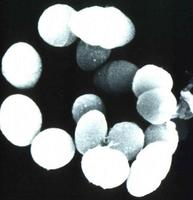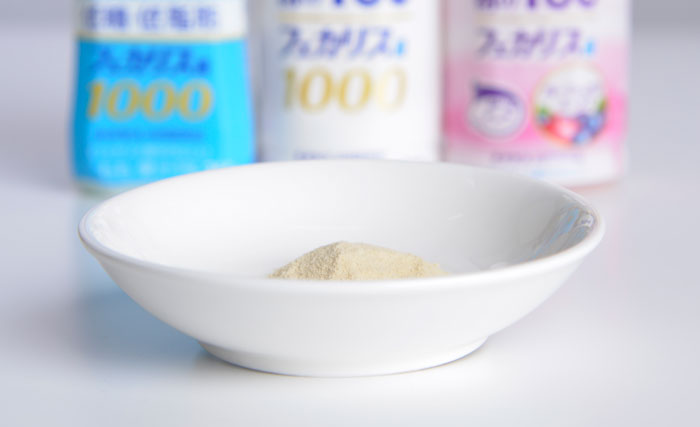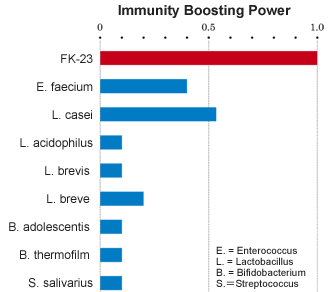Concentrated Lactic Acid Bacilli

Concentrate of FK-23 Successfully Synthesized, Most Effective at Boosting Immunities Among Many Types of Lactic Acid Bacilli.

Quality and Quantity of Lactic Acid Bacilli Key for Optimal Regulation of Intestinal Environment.
It is a well-known fact that lactic acid bacilli help regulate the intestinal environment. Among the huge variety of these bacilli are some which can boost our immune systems. One of those is concentrated lactic acid bacilli, a lactic acid food product featuring concentrated FK-23.
FK-23 is being researched at institutions such as Okayama University and Hokkaido University. It has been found to be the best immunity booster of the various types of lactic acid bacilli. Its immunity boosting effect can be tripled if the FK-23 is specially cultivated, heat treated, and then dried. Concentrated lactic acid bacilli may contain over 1 trillion particles per gram of heat-treated and dried FK-23.

Concentrated lactic acid bacilli increases interferon and tumor necrosis factor levels. There is also evidence that it has antitumor effects. In one experiment, cancer-infected lab rats that were given a cocktail of anti-cancer medication and FK-23 exhibited an increased reduction of cancer cells compared to treatment with medicine alone. Now, concentrated lactic acid bacilli is under consideration to be designated an antitumor drug.
In addition, FK-23 lessens the side effects of anticancer drugs. In one experiment, FK-23 was found to help replenish the white blood cell counts which were reduced by anticancer medication in animal test subjects. Furthermore, in another experiment on animal test subjects, it was found to help prevent loss in liver and kidney function.
When turning one's attention to the immunity boosting FK-23, numbers are key. Dr. Ryusho Okafuji, head of the Okafuji Clinic, uses concentrated lactic acid bacilli in his treatment of cancer and other incurable diseases. He has this to say:
"One must take in at least 1 trillion of these bacteria in a day to receive the benefits, such as improved intestinal health, of lactic acid bacilli food products. Normal, commercially available products contain at most 10 billion organisms per 100ml. If you do the math, you see that you need to consume at least 10L of these food and drink products every day. This is not realistic. Medicinal lactic acid bacilli formula contains 10 billion organisms per gram, but even by consuming enough of this to have 100 trillion organisms, you won't improve the balance of your intestinal bacteria. Conversely, concentrated lactic acid bacilli contains over 1 trillion FK-23 bacteria per gram. It quickly improves the intestinal environment into one dominated by good bacteria, while simultaneously stimulating Peyer's patch, considered the immunity switch of the body, boosting our intestinal immunity."

Enzyme Processed FK-23 Breaks Down into Lung-Defending LFK
LFK, which is made by processing FK-23 with enzymes to break it down, has been gaining attention. It has been found to inhibit the breakdown in the barrier function of alveolar cells caused by influenza virus infection. During an influenza infection, immune cells take action to protect the lungs. In such cases, excessive lung inflammation can cause difficulty breathing, which can sometimes result in death. Taking LFK suppresses excess inflammation. Also, it stimulates the production of the lung-protecting proteins and type II alveolar cells, which can specialize themselves as type I cells. These type I cells assist in gas exchange, thereby lessening impairment in lung function.
I was the first person to discover that lactic acid bacilli intake increases type II alveolar cell levels. Improved lung function due to LFK intake may also be effective in combatting bacterial pneumonia and chronic obstructive pulmonary disease (COPD).












